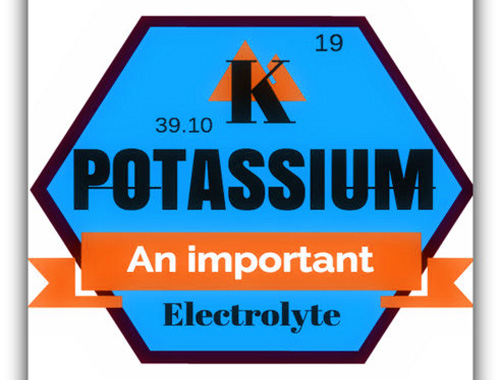Hypokalemia

Published: 18 Jun 2025
ICD9: 276.8 ICD10: E87.6 ICD11: 5C77
Hypokalemia refers to a condition in which there is a lower than normal level of potassium in the blood.
Here's a breakdown:
![]() Potassium (K+): An essential electrolyte in the body. It plays a crucial role in many bodily functions, including:
Potassium (K+): An essential electrolyte in the body. It plays a crucial role in many bodily functions, including:![]()

![]() Nerve and muscle function (especially heart muscle)
Nerve and muscle function (especially heart muscle)![]()

![]() Maintaining fluid balance
Maintaining fluid balance![]()

![]() Regulating blood pressure
Regulating blood pressure![]()

![]() Moving nutrients into cells and waste products out
Moving nutrients into cells and waste products out
![]() Normal Potassium Levels: Typically, normal blood potassium levels range from 3.5 to 5.0 milliequivalents per liter (mEq/L).
Normal Potassium Levels: Typically, normal blood potassium levels range from 3.5 to 5.0 milliequivalents per liter (mEq/L).
![]() Hypokalemia Levels: Hypokalemia is generally defined as a potassium level below 3.5 mEq/L. The lower the potassium level, the more severe the condition.
Hypokalemia Levels: Hypokalemia is generally defined as a potassium level below 3.5 mEq/L. The lower the potassium level, the more severe the condition.
Causes of Hypokalemia:
Hypokalemia can result from various factors, including:
![]() Excessive Potassium Loss:
Excessive Potassium Loss:![]()

![]() Diuretics (water pills): The most common cause. Many diuretics increase potassium excretion in the urine.
Diuretics (water pills): The most common cause. Many diuretics increase potassium excretion in the urine.![]()

![]() Vomiting and Diarrhea: Loss of potassium through gastrointestinal fluids.
Vomiting and Diarrhea: Loss of potassium through gastrointestinal fluids.![]()

![]() Excessive Sweating: Particularly in hot climates or during strenuous exercise.
Excessive Sweating: Particularly in hot climates or during strenuous exercise.![]()

![]() Kidney Problems: Certain kidney diseases can impair potassium reabsorption.
Kidney Problems: Certain kidney diseases can impair potassium reabsorption.
![]() Inadequate Potassium Intake:
Inadequate Potassium Intake:![]()

![]() Poor Diet: While rare in developed countries, insufficient potassium intake can contribute to hypokalemia.
Poor Diet: While rare in developed countries, insufficient potassium intake can contribute to hypokalemia.![]()

![]() Eating Disorders: Such as anorexia or bulimia.
Eating Disorders: Such as anorexia or bulimia.
![]() Potassium Shift into Cells:
Potassium Shift into Cells:![]()

![]() Insulin Therapy: Insulin causes potassium to move from the bloodstream into cells, lowering blood potassium levels.
Insulin Therapy: Insulin causes potassium to move from the bloodstream into cells, lowering blood potassium levels.![]()

![]() Alkalosis: A condition where the blood is too alkaline (high pH).
Alkalosis: A condition where the blood is too alkaline (high pH).![]()

![]() Certain Medications: Some medications can cause potassium to shift into cells.
Certain Medications: Some medications can cause potassium to shift into cells.
Symptoms of Hypokalemia:
Symptoms can vary depending on the severity of the potassium deficiency. Mild hypokalemia may cause no symptoms. More severe hypokalemia can lead to:
![]() Muscle Weakness, Cramps, and Spasms: This is a common symptom.
Muscle Weakness, Cramps, and Spasms: This is a common symptom.
![]() Fatigue and Lethargy: Feeling tired and lacking energy.
Fatigue and Lethargy: Feeling tired and lacking energy.
![]() Constipation: Potassium is important for proper bowel function.
Constipation: Potassium is important for proper bowel function.
![]() Irregular Heartbeat (Arrhythmia): This is the most dangerous symptom, as it can lead to cardiac arrest.
Irregular Heartbeat (Arrhythmia): This is the most dangerous symptom, as it can lead to cardiac arrest.
![]() Muscle Paralysis: In severe cases.
Muscle Paralysis: In severe cases.
![]() Tingling or Numbness: Particularly in the extremities.
Tingling or Numbness: Particularly in the extremities.
![]() Difficulty Breathing: Due to weakness of respiratory muscles.
Difficulty Breathing: Due to weakness of respiratory muscles.
Diagnosis:
![]() Blood Test: A blood test to measure potassium levels is the primary diagnostic tool.
Blood Test: A blood test to measure potassium levels is the primary diagnostic tool.
![]() Electrocardiogram (ECG or EKG): An ECG can detect changes in heart rhythm caused by hypokalemia.
Electrocardiogram (ECG or EKG): An ECG can detect changes in heart rhythm caused by hypokalemia.
![]() Medical History and Physical Examination: To help identify the underlying cause.
Medical History and Physical Examination: To help identify the underlying cause.
Treatment:
Treatment depends on the severity of the hypokalemia and the underlying cause.
![]() Potassium Supplements: Oral or intravenous potassium supplements are often prescribed. Oral supplements are preferred for mild to moderate cases. Intravenous potassium is used for severe cases or when oral supplements are not tolerated.
Potassium Supplements: Oral or intravenous potassium supplements are often prescribed. Oral supplements are preferred for mild to moderate cases. Intravenous potassium is used for severe cases or when oral supplements are not tolerated.
![]() Dietary Changes: Increasing potassium-rich foods in the diet.
Dietary Changes: Increasing potassium-rich foods in the diet.
![]() Addressing the Underlying Cause: Treating the underlying medical condition that is causing the potassium loss (e.g., adjusting diuretic medication, treating diarrhea).
Addressing the Underlying Cause: Treating the underlying medical condition that is causing the potassium loss (e.g., adjusting diuretic medication, treating diarrhea).
Foods Rich in Potassium:
![]() Bananas
Bananas
![]() Oranges
Oranges
![]() Potatoes (especially with the skin on)
Potatoes (especially with the skin on)
![]() Sweet Potatoes
Sweet Potatoes
![]() Spinach
Spinach
![]() Tomatoes
Tomatoes
![]() Avocados
Avocados
![]() Dried Fruits (e.g., apricots, prunes)
Dried Fruits (e.g., apricots, prunes)
![]() Beans and Legumes
Beans and Legumes
Important Note:
Hypokalemia can be a serious condition, especially if it is severe. It is crucial to consult a healthcare professional if you suspect you may have hypokalemia. Self-treating with potassium supplements can be dangerous and can lead to hyperkalemia (too much potassium), which is also a serious condition.